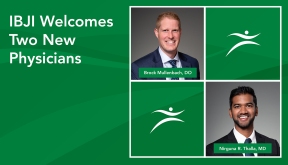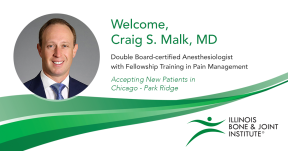The physicians at the Illinois Bone and Joint Institute clinics treat thousands of people suffering from chronic pain every year. It’s not unusual for patients to put off seeing a physician for their pain. The reasons for their delay are sometimes based on commonly held misconceptions. We have compiled a list of pain management myths our physicians hear on a normal basis. Hopefully busting these myths will ensure that no one lives with unnecessary pain or receives an incomplete pain treatment plan again.
All doctors are qualified to treat pain.
MYTH – When it comes to treating pain not all doctors are equal. It takes years of specialized training to be able to effectively analyze, diagnose, and treat a patient experiencing chronic pain. In some cases it even requires further specialization to treat pain. When the pain is caused by a rheumatic diseases, like arthritis, or autoimmune diseases, like lupus, a rheumatologist is needed to treat both the pain and the underlying condition.
Getting pain treatments means you’re weak.
MYTH – Admitting you are in pain and getting treated can be scary. It means you don’t know what is causing the pain and that you are turning over your pain relief treatment to someone else. It actually takes a great deal of courage to seek out medical treatment for your pain.
You’ll probably get addicted to pain medication.
MYTH – The well publicized stories of celebrities, like Rush Limbaugh and Michael Jackson, becoming addicted to their pain drugs makes it seem like everyone gets addicted to their prescription pain medication. While it is true that some people get addicted to certain types of painkillers, the actual occurrence of addiction to pain medication is very low. If you are worried about becoming addicted, or have a family history of addiction, let you rheumatologist know so that they can take your concerns into account when deciding on how to treat your pain.
Pain is affected by the weather
TRUE – Not everyone’s pain is affected by changes in the weather, but it does happen. Though physicians are not positive as to the reasons, there does appear to be pattern associated with the barometric pressure. Low pressure systems found during cold weather seems to make the pain worse. Warmer weather associated with high pressure systems usually brings a reduction in the pain.
There is a “silver bullet” for every type of pain.
MYTH – There is almost never one treatment that cures chronic pain. Usually a complete pain management regimen involves many different treatments. Your physician may prescribe things like medication, physical therapy, immobilization, and ice.
Rest is best for pain
MYTH – In some cases a physician may prescribe a short period of rest, like after surgery. Almost always though, physical therapy or even exercise will be included in a pain treatment plan. For example, exercise benefits arthritis patients in many ways and is an option that rheumatology specialist’s often include for pain management.
Minor pain doesn’t need to be seen by a physician.
MYTH – Anytime pain worries you, or causes you long-term discomfort it is best to be seen by a physician who is trained in pain management. In the best cases, at-home treatments will offer only temporary relief of chronic pain. In the worst situations, self-treating pain can actually cause more damage. It is critical to be seen by a rheumatic physician or pain management specialist. The doctors at IBJI are your best choice for pain management in Illinois. Schedule online today to stop the pain from getting worse and start getting some much needed relief.
*This content is for information only and is not intended to replace the diagnosis, treatment, or medical advice from your treating healthcare professionals. The content does not provide medical advice, does not constitute the practice of medicine or other healthcare professional services, and does not create a doctor-patient relationship. You should not rely on this information as a substitute, nor does it replace professional medical advice, diagnosis, or treatment. If you have concerns or questions, seek the advice of your healthcare professionals. If you think you may have a medical emergency, call your doctor or 911 immediately. Do not rely on electronic communications or communicate through this website for immediate, urgent medical needs. This website is not designed to facilitate medical emergencies. The use of the information is at the reader’s own risk. The links are provided for information and convenience only. We cannot accept responsibility for the sites linked or the information found here. A link does not imply an endorsement of a site.




